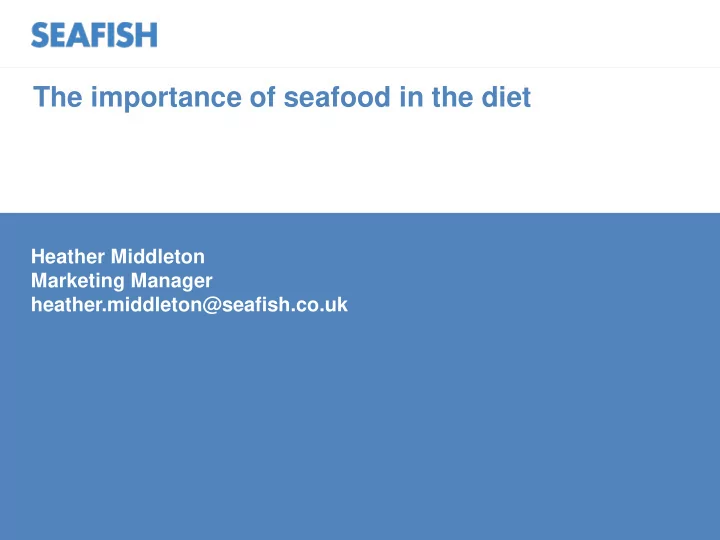

The importance of seafood in the diet Heather Middleton Marketing Manager heather.middleton@seafish.co.uk
Presentation Overview Overview of Seafish and my area of work Importance of seafood in the diet of our workforce and nation Our health campaign results and brief overview What you can do in your workplace
Overview of Seafish and the work you do – company and individual role Seafish remit Marketing Manager Our mission is to support a profitable, Management of all consumer and sustainable and socially responsible health work future for the seafood industry. Day-to-day • Managing a team of 4 FTE and Our remit includes everything - and working with a whole range of others everyone - from fishermen and • Working with industry from multiple processors through to retailers, retailers to individual sole traders restaurants and consumers. • Delivering marketing campaigns to cover the UK to targeted consumer www.seafish.co.uk segments.
How is eating seafood important for our workforce and the nation? Just one example … Poor heart health costs 3000+ studies from the NHS £9 billion around the world have annually found eating seafood can keep the heart healthier Heart health a big killer 179K lives Countries with a diet 28% premature male deaths and high in seafood have a 19% premature female deaths very low incidence of heart disease.
Omega-3 - The Superfishoil Our bodies can’t produce omega -3 naturally, so we should try to enjoy seafood at least twice a week to ensure our bodies get the omega-3 they need to thrive. • Love heart health - one of the main benefits of the long-chain omega-3 fats in fish is to keep the heart healthy. • Fuelling brain power omega-3 is proven to contribute to the maintenance of normal brain function from cradle to grave. • Eye health - contributes to the maintenance of normal vision in all ages
Eating Seafood - Vitamins and Minerals • Vitamin D helps the body absorb/use calcium and phosphorus for bones, muscles, immune system and teeth. Around a fifth of all adults have low levels of vitamin D. • B vitamins give us energy and helps our nervous system • Calcium is needed for our bones, muscles, nerves, digestive system, energy and ensures our blood clots • Zinc has many vital functions in the body including helping our immune system
Seafood Importance - Vitamins and Minerals • Iron helps give us energy and can reduce tiredness. 23% of women aged 19-64 have extremely low levels of iron • Iodine helps to regulate the body’s metabolism. • Potassium maintaining normal blood pressure, and muscle and nerve function. • Selenium helps our immune system protect us from the inside out. 38% of 19-64 year olds and 42% of over 65’s have very low intakes of selenium.
Seafood helping to tackle obesity Almost two thirds of people in the UK are overweight or obese • A small change of eating more seafood can add up – weighing too much increases the risk of health problems including heart disease, type 2 diabetes, high blood pressure and certain cancers. • Seafood keeps you fuller for longer - as seafood is high in protein it make us feel fuller than foods that are high in fat or carbohydrates. • Low fat, low carb - most white fish and shellfish are low in fat and low in carbs • All goodness - all types of fish are nutrient dense which means there are a lot of nutrients in proportion to calories. Small changes to diet can make big differences to waistlines. One of the easiest things we can do is eat more seafood and ultimately two portions of fish a week!
UK falling significantly short of seafood consumption recommendations 1.15 portions a 2aweek – week in UK globally recognised On average, we manage to eat just 1 portion of oil-rich fish every 3 a healthy diet should weeks!* include at least two portions of fish a week, including one of oily fish. 2aweek – a simple message with clear call to action for everyone consumers to procurement/menu planners
Changing awareness on seafood and health
AWARENESS RESULTS Seafish Campaign Activation January to March 2017 Recommended advice to eat 2 portions of fish a week March 2017 December 2016 28% 20% NHS/health professionals recommendation to eat fish twice a week as part of a healthy diet March 2017 December 2016 28% 34%
Targeting and Our Campaign Pillars Targeting
What can you do in your workplace • Make seafood health information available to employees in staff rooms/work areas, intranet/employee channels • Use the free resources and toolkits from Seafish • Point employees to www.2aweek.co.uk • Organise a 2aweek challenge or pledge • Sign up in 2018 Healthy Eating Week 11-15 June and Seafood Week 5-12 October • Appoint a health champion – for peer to peer marketing • Don’t forget your internal marketing and external marketing • Don’t just look at health as a flash in the pan activity it’s a long term project
Recommend
More recommend